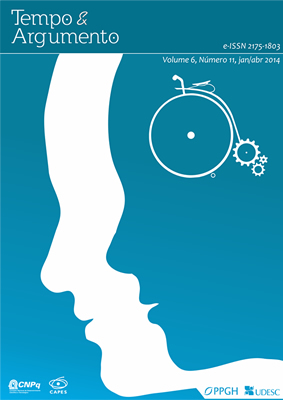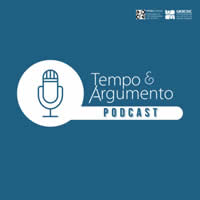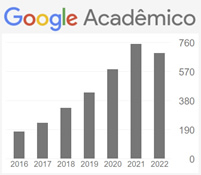Concepções em mudança do pensamento histórico no ensino da história: um estudo de caso australiano
DOI:
https://doi.org/10.5965/2175180306112014137Resumo
Muitos países vivenciaram conflitos em torno do conteúdo do seu currículo de história e tiveram debates sobre a importância relativa de habilidades (pensamento histórico) versus conteúdo (conhecimento histórico). A Austrália não é uma exceção. Este artigo busca contribuir para as discussões sobre a importância do pensamento histórico no ensino da História explorando as concepções em mudança de pensamento histórico nos currículos de história de New South Wales (NSW) (o mais populoso estado da Austrália, que evoluiu de uma antiga colônia britânica e tem uma ininterrupta tradição de ensino de história no ensino médio, e um curso adicional ao ensino obrigatório, que é único no país). Recentemente, a história se tornou um tema obrigatório em todas as escolas australianas, desde o primeiro fundamental até o último ano da escola obrigatória (F-10), pela primeira vez desde a federalização dos estados australianos (1901), quando se determinava constitucionalmente que o currículo era uma responsabilidade do Estado. Este artigo mapeia as formas cambiantes e a importância relativa do pensamento histórico como um resultado explícito do ensino de história nos currículos de história de NSW, desde o seu surgimento no currículo de história eletivo da década de 1970 até a explicitação nas ementas de NSW para o Currículo “nacional” obrigatório australiano. Ele também explora a natureza e o significado do curso adicional “sênior” de história posterior à escola obrigatória de NSW, uma opção para os alunos de história no ano final não obrigatório de escolarização. Este curso adicional incorpora em grande medida o estudo da historiografia, exigindo dos alunos que apliquem suas intuições meta-históricas numa investigação historiográfica original, ancorando teoria histórica complexa numa experiência de ser historiador. Defendemos que esta atitude de incorporar a historiografia no currículo expande a noção do que constitui o pensamento histórico no ensino de história. Assim, concluímos com a reflexão sobre o que esses diferentes modos de conceituar o pensamento histórico significam para a função social e educacional da história, e quais implicações eles sugerem para o ensino da história.
Palavras-chave: Ensino da História; Pensamento Histórico; Austrália.Downloads
Referências
AHONEN, Sirkka. Coming to terms with a dark past: how post-conflict societies deal with history. New York: Peter Lang, 2012.
AL-HAJ, Majid National ethos, multicultural education, and the new history textbooks in Israel. Curriculum Inquiry, v. 35, n. 1, p. 47-71, 2005.
ALDRICH, Richard. History in the national curriculum. London: Kogan Page, 1991.
APPLE, Michael W. The hidden curriculum and the nature of conflict. In: PINAR, William (Org.). Curriculum theorizing: the reconceptualists. Berkley, C.A. McCutchan Publishing Corporation, 1975. p. 95-119.
BARCAN, Alan. A history of Australian education. Melbourne: Oxford University Press, 1980.
BARTON, Keith C. Teaching history for the common good. Chicago: Lawrence Erlbaum, 2004.
BENNETT, Tony. The birth of the museum: history, theory, politics. London: Routledge, 1995.
BLAINEY, Geoffrey. Drawing up a balance sheet of our history. Quadrant, v. 37, n. 7-8, p. 10-15, 1993.
BOARD OF STUDIES NSW. History stages 4-5 syllabus. Sydney, NSW: 1998.
BOARD OF STUDIES NSW. HSC history extension syllabus. Sydney, NSW: 2000.
BOARD OF STUDIES NSW. History years 7-10 syllabus (mandatory and elective courses). Sydney, NSW: 2003.
CLARK, Anna. Teaching the nation: politics and pedagogy in Australian history. Melbourne, VIC: Melbourne University Press, 2004.
CLARK, Anna. What do they teach our children? In: MACINTYRE, S.; CLARK, A. (Org.). The history wars. Melbourne: Melbourne University Press, 2003. p. 171-190.
CLARK, Anna. History's children: history wars in the classroom. Sydney: University of New South Wales Press, 2008.
COUNSELL, Christine. Historical knowledge and historical skills: A distracting dichotomy. In: ARTHUR, James; PHILLIPS, Robert (Org.). Issues in History teaching. London: Routledge, 2000. p. 52-71.
CROWE, David. Christopher Pyne tackles leftist 'bias' in classrooms. The Australian. Canberra: News Corp Australia. Midday 2014.
DONNELLY, Kevin. The black armband view of history. Agora, v. 32, n. 2, p. 15, 1997.
FITZGERALD, Janis. History and the core curriculum: a response to core curriculum for Australian schools. Teaching History, v. 15, n. 2, p. 69-85, 1981.
GADAMER, Hans-Georg. Truth and method. New York: Crossroad, 1992.
GRIMSHAW, Pat. History: Searching for identity. Annual State Conference of the Queensland History Teachers Association (QHTA), 1996, Brisbane.
GUYVER, Robert. The shape of the Australian history curriculum: a comparative perspective. Agora, v. 44, n. 4, p. 9-16, 2009.
HALSE, Christine; HARRIS, Catherine. National identity and social cohesion: the social use of history curriculum in the United Kingdom, the US and Australia. Annual Conference of the Australian Association for Research in Education (AARE), 2004, University of Melbourne, November 28 - December 2, 2004.
HARRIS, Catherine. History curriculum development in New South Wales: issues of control and its impact on teachers. Annual Conference of the Australian Association for Research in Education (AARE), 2004, University of Melbourne, VIC.
HENDERSON, Deborah J. What is education for? Situating history, cultural understandings and studies of society and environment against neo-conservative critiques of curriculum reform. Australian Journal of Education, v. 49, n. 3, p. 306-319, 2005.
HOWARD, John. Unity vital in battle against terrorism. The Sydney Morning Herald. Sydney: 11 p. 2006.
HUGHES-WARRINGTON, Marnie et al. Historical thinking in higher education: An ALTC discipline-based initiative. Australian Learning and Teaching Council. Sydney. 2009
JOHNSTON, Gary. An historical perspective of the 1980 syllabus in history for years 7-10. Teaching History, v. 15, n. 4, p. 65-81, 1982.
LAND, Ray. Invasion and after: a case study in curriculum politics. Brisbane: Queensland Studies Centre, 1994.
LEE, Paul. Historical literacy: Theory and Research. International Journal of Historical Learning, Teaching and Research, v. 5, n. 1, 2005.
LEE, Paul; ASHBY, Rosalyn. Progression in historical understanding ages 7-14. In: STEARNS, Peter N.; SEIXAS, Peter; WINEBURG, Samuel(Org.). Knowing, teaching, and learning history: national and international perspectives. New York: New York University Press, 2000. p. 199-222.
LEINHARDT, Gaea; BECK, IsabelL.; STAINTON, Catherine. Teaching and learning in history. Hillsdale, NJ: Lawrence Erlbaum Associates, 1994.
MACINTYRE, Stuart. The history wars. Teaching History, v. 38, n. 2, p. 4-14, 2004.
MACINTYRE, Stuart; CLARK, Anna. The history wars. Melbourne: Melbourne University Press, 2003.
MACRAILD, Donald M.; TAYLOR, Avram. Social theory and social history. London: Palgrave Macmillan, 2004.
MELLEUISH, Gregory. The teaching of Australian history in Australian schools: a normative approach. The Australian History Summit, 2006, Canberra. August 17.
NASH, Gary B.; CRABTREE, Charlotte; DUNN, Ross E. History on trial: culture wars and the teaching of the past. New York: Alfred A, Knopf, 1998.
OSBORNE, Graeme; MANDLE, WilliamFrederick (Orgs.). New history: studying Australia today. Sydney: George Allen &Unwined. 1982.
PARKES, Robert John. Reading History curriculum as postcolonial text: towards a curricular response to the history wars in Australia and beyond. Curriculum Inquiry, v. 37, n. 4, p. 383-400, 2007.
PARKES, Robert John. Teaching History as historiography: engaging narrative diversity in the curriculum. International Journal of Historical Learning, Teaching and Research, v. 8, n. 2, p. 118-132, 2009.
PARKES, Robert John. Interrupting history:rRethinking history curriculum after 'the end of history'. New York: Peter Lang, 2011.
PHILLIPS, Robert. History teaching, nationhood and the state: a study in educational politics. London: Cassell, 1998.
RICHARDSON, George H. The death of the good Canadian: teachers, national identities, and the social studies curriculum. New York: Peter Lang, 2002.
SECONDARY SCHOOLS BOARD. History Syllabus: secondary Schools. Sydney, NSW: Secondary Schools Board 1971.
SECONDARY SCHOOLS BOARD. History in N.S.W. secondary Schools, Years 7-10. Sydney, NSW: Secondary Schools Board, 1980.
SEGALL, Avner. What's the purpose of teaching a discipline, anyway? In: SEGALL, Avner; HEILMAN, Elizabeth; CHERRYHOLMES, Cleo H (Org.). Social studies - the next generation: re-searching in the postmodern. New York: Peter Lang, 2006. p. 125-139.
SEIXAS, Peter. Historical understanding among adolescents in a multicultural setting. Curriculum Inquiry, v. 23, n. 3, p. 301-327, 1993a.
SEIXAS, Peter. Popular film and young people's understanding of the history of Native American-White relations. The History Teacher, v. 26, n. 3, p. 351-370, 1993b.
SEIXAS, Peter. Benchmarks of Historical Thinking: a framework for assessment in Canada. Centre for the study of historical consciousness, University of British Columbia. Vancouver, CA. 2006
SHARPE, Jim. History from below. In: BURKE, Peter(Org.). New perspectives on historical writing. Cambridge, UK: Polity Press, 1991. p. 24-41.
SHEMILT, Denis. History 13-16: evaluation study. Edinburgh: Holmes McDougall, 1980.
TAYLOR, Tony. Howard's End: a narrative memoir of political contrivance, neoconservative ideology and the Australian history curriculum. Curriculum Journal, v. 20, n. 4, p. 317-329, 2009. ISSN 0958-5176.
TAYLOR, Tony; CLARK, Anna. An overview of the teaching and learning of Australian history in schools. The Australian History Summit, Canberra. Canberra 2006.
TAYLOR, Tony; GUYVER, Robert(Orgs.). History wars in the classroom: Global perspectives. London: Information Age Publishinged. 2011.
TAYLOR, T.; YOUNG, C. Making history: A guide for the teaching and learning of history in Australian schools. Carlton South, VIC: Curriculum Corporation, 2003.
THOMPSON, K. Civics and citizenship education in New South Wales and its implications for teaching history. 1999. thesis submitted in partial fullfilment of the requirements for the degree of Bachelor of Education (Honours) Faculty of Education, The University of Sydney
VAN BOXTEL, C; VAN DRIE, J. Historical reasoning: a comparison of how experts and novices contextualise historical sources. International Journal of Historical Learning, Teaching and Research, v. 4, n. 2, 2004.
VANSLEDRIGHT, B. A. Closing the gap between school and disciplinary history? Historian as high school history teacher. In: BROPHY, J (Org.). Advances in Research on Teaching. Greenwich, Conn.: JAI Press, v.6, 1996. p. 257-289.
VIRTA, A. Historical literacy: Thinking, reading and understanding history. Journal of Research in Teacher Education, v. 14, n. 4, p. 11-25, 2007.
WILSON, S. M.; WINEBURG, S. Peering at history through different lenses: the role of disciplinary perspectives in teaching history. Teachers College Record, v. 89, n. 4, p. 525-539, 1998.
WINDSCHUTTLE, K. The killing of history: How literary critics and social theorists are murdering our past. New York: The Free Press, 1996.
WINEBURG, S. Historical thinking and other unnatural acts. Canadian Historical Consciousness in an International Context: theoretical Frameworks conference, 2001, University of British Columbia, Vancouver, BC.
WINEBURG, S. Historical thinking and other unnatural acts: charting the future of teaching the past. Philadelphia: Temple University Press, 2001.
YILMAZ, K. Introducing the 'linguistic turn' to history education. International Education Journal, v. 8, n. 1, p. 270-278, 2007.





